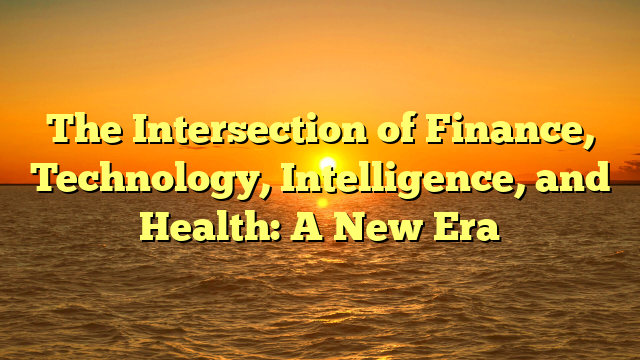In today’s rapidly evolving world, the intersection of finance, technology, intelligence, and health has become more significant than ever before. These sectors, once seemingly distinct, are now intricately intertwined, shaping the future of global economies, healthcare systems, and individual lives. In this article, we will explore how these domains are influencing each other, creating opportunities and challenges for both individuals and organizations.
Finance and Technology: Technology has played a pivotal role in reshaping the financial landscape. Financial institutions have adopted cutting-edge technologies to improve operational efficiency, enhance customer experience, and offer personalized financial products. The use of artificial intelligence (AI) in credit scoring, risk management, and investment strategies has paved the way for smarter financial decision-making.
Intelligence and Technology: The field of artificial intelligence is rapidly evolving, with breakthroughs in machine learning, deep learning, and neural networks driving technological progress. AI systems are capable of understanding complex data, recognizing patterns, and even simulating human-like cognitive functions. This opens up new possibilities for improving both individual and collective intelligence, from healthcare diagnostics to financial predictions.
PBOWIN and Technology: Technology has also had a profound impact on the healthcare industry, improving everything from diagnostics to treatment options. With the rise of telemedicine, wearable devices, and AI-powered diagnostic tools, healthcare has become more personalized and accessible. These technologies are helping doctors make faster, more accurate diagnoses and allowing patients to receive care remotely, reducing the need for in-person visits.
Intelligence, Health, and Finance: Integrating intelligence, health, and finance is proving beneficial for both individuals and healthcare organizations. AI algorithms are being used to assess the financial implications of health risks, allowing for better budgeting and investment in preventive care. Furthermore, advancements in personalized health technologies are leading to improved patient outcomes while reducing the financial burden on healthcare systems.
Conclusion: As the worlds of finance, technology, intelligence, and health continue to evolve, the potential for positive change is immense. By harnessing the power of AI, data analytics, and digital technologies, we can create a future that is healthier, smarter, and more financially secure. However, we must approach this future with careful consideration of privacy, equity, and ethical responsibility to ensure that progress benefits all.
In conclusion, the integration of finance, technology, intelligence, and health holds immense promise for improving the quality of life for individuals worldwide. While there are challenges ahead, the opportunities for innovation and advancement are vast. By fostering collaboration between these fields, we can build a more prosperous and sustainable future.
